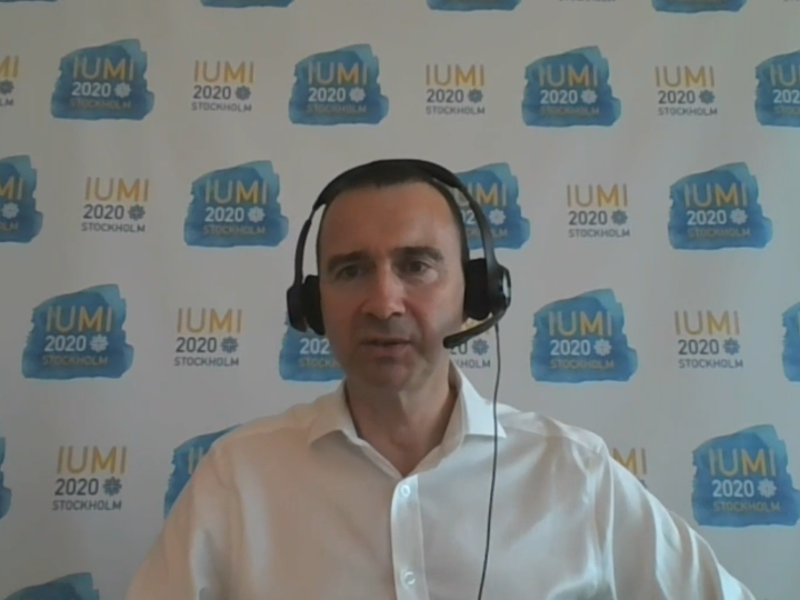In his keynote address to the International Union of Marine Insurance (IUMI) annual conference, IUMI President, Richard Turner, focused on four areas that are set to exert maximum impact on the marine insurance sector of the future – these were identified as the COVID-19 pandemic, the changing macro-economic and geopolitical situation, climate change and sustainability, and data and digitalisation.
On COVID, Turner said:
“The uncertainty stemming from the coronavirus pandemic has significantly affected the global insurance industry and, inevitably, that has impacted on the marine sector. The slowdown in world trade coupled with an earlier slump in the oil price should result in a reduction in the overall premium base. We are seeing disruption and delays at some ports with queues of vessels waiting for a berth, and this is building an unwanted accumulation of risk as a consequence. COVID is also disrupting supply chains which in recent years have become more globalised than ever before. Post-COVID, it is possible we’ll see a shift to a more simple and local logistics pattern as geopolitical tensions and the impact of the virus exert a longer-lasting effect.”
“Marine insurance tends to cover physical damage and so COVID isn’t impacting directly on our claims profile, but as part of a much larger insurance business environment, we are being affected indirectly. With a recent history of unprofitable underwriting years, COVID is increasing the pressure on marine lines of business to return to a sustainable technical profit."
Turner went on to discuss other challenges:
The WTO reported an 18% fall in world trade in Q2, reflecting less cargo being moved. Coupled with this, a growth in protectionism and a move to greener economies will inevitably change the dynamics of the marine insurance business. The depressed oil price has slowed production and the commissioning of new offshore facilities, as well as writing-down the asset base of many oil companies – this will also challenge marine underwriters.
Climate change has begun to influence the size and severity of marine claims; and rising sea levels in areas where sea defences are weak (or merely sufficient to manage historic peak sea levels) will continue to exert pressure on the sector. In the longer term, as a large part of marine insurance is dominated by a reliance on fossil-fuel – either assets powered by oil, carrying oil or producing oil – a move by society away from this type of energy will inevitably have an impact. Similarly, some other industries have the potential to become unsustainable (the future viability of the fishing sector is an example of what might happen if sustainable living conditions in the world’s oceans continue to be challenged), or less acceptable to insure (such as coal) and this will also have a negative effect. More positively however, the continued growth of new industries such as offshore renewable energy, has the potential to offset this predicted future loss of business.
Moving to digitalisation, Turner discussed “blending the art of underwriting with the science of data management and insight”. Opining that the marine sector was lagging behind other insurance lines, probably because of its relative size, Turner believed marine insurance was ripe for change. Big Data, Internet of Things and digitalisation in general would soon be making its presence felt. He said:
“COVID has changed the way the market operates, particularly in London. Brokers and underwriters have embraced remote-working and we’ve seen more online placing than ever before. It is difficult to see this process reversing significantly once the pandemic is over”.
IUMI will continue to monitor and, where appropriate, take a leadership position on the many challenges and opportunities facing marine insurance. Its unique position allows it to bring relevant parties together to raise awareness and encourage change.
Ends
Further information from:
Katerina Dimitropoulos, Navigate PR (London)
T: +44 (0)20 3326 8463 / +44 (0) 7469 035425
E: kdimitropoulos@navigatepr.com
Notes to editors:
The International Union of Marine Insurance (IUMI) represents 45 national and marine market insurance and reinsurance associations. Operating at the forefront of marine risk, it gives a unified voice to the global marine insurance market through effective representation and lobbying activities. As a forum for the exchange of ideas and best practice, IUMI works to raise standards across the industry and provides opportunities for education and the collection and publication of industry statistics. IUMI is headquartered in Hamburg and traces its roots back to 1874.
More information can be found at www.iumi.com

